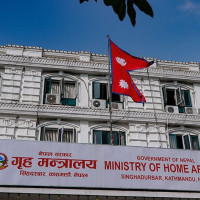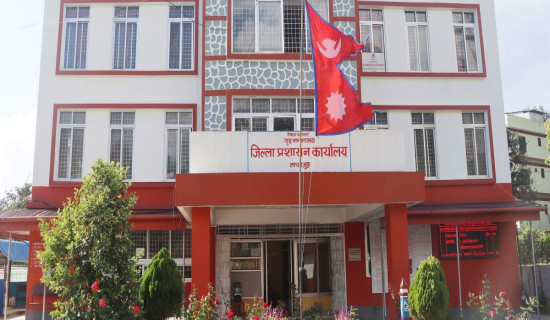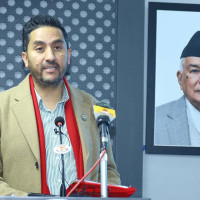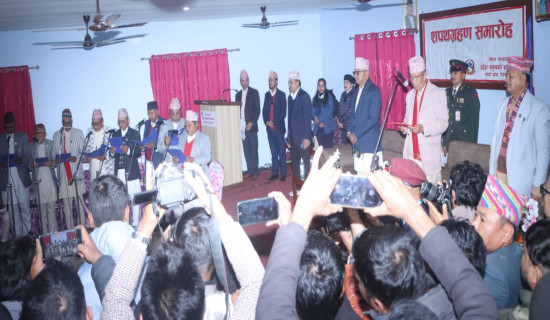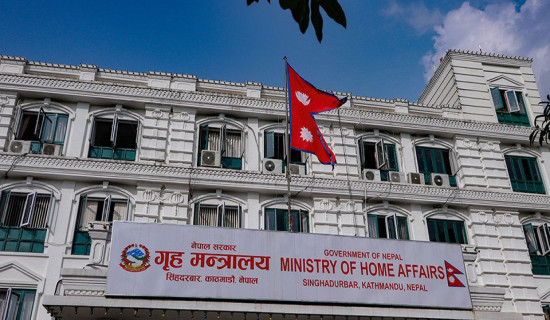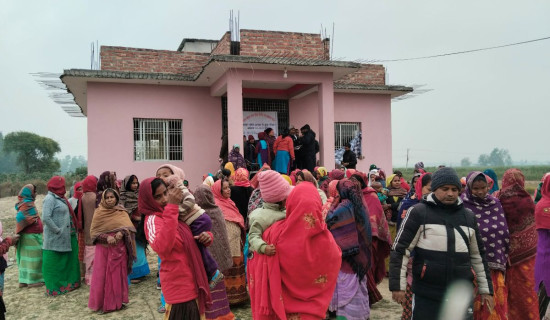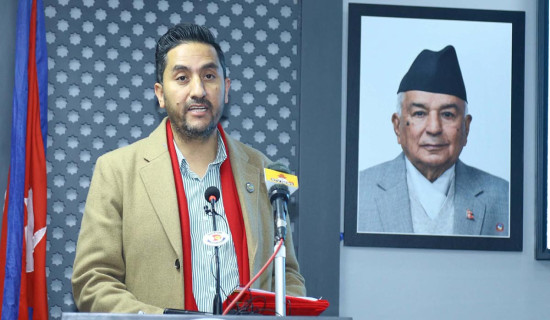- Wednesday, 7 January 2026
Human-wildlife conflict continues in Kavrepalanchok; 14 people killed in 14 years
By Raj Kumar Parajuli, Kavrepalanchok, Aug 31: Human-wildlife conflict continues for ages. The conflict has increased to the extent that many people have lost their lives, and many others were injured in wild animal attacks. Similarly, many wild animals have died due to attacks by humans. According to data from the Division Forest Office, Dhulikhel, 14 people were killed and scores of others injured in wild animal attacks in the past 14 years.
Five local farmers have recently filed separate complaints with the ward office of Panauti Municipality-15 demanding the control of the menace of wild boars and compensation for corn farming destroyed by them.
“Wild boars ate and destroyed corns planted in two ropanis of land. We have lodged complaints demanding the control of the wild animals and compensation for the damage,” said Shankar Koirala, one of the locals whose crops were damaged by the wild boars. He spent Rs 20,000 to cultivate corn in two ropanis of land, he said. Wild boars straying from nearby Indrashwori Thalpu forest ‘A’ entered the village and destroyed the crop that was about to ripen, he complained. Wild boars have been destroying corn in Khopasi for the past few days.
The wild animal that came from the nearby forest destroyed corn grown in 10 ropanis of land, said another farmer Maiya Mahat, adding that the wild animal has been wreaking havoc in the village for a long time. “The forest office provides a maximum of Rs 10,000 as compensation for crops destroyed by wild animals after going through the due process. I also received compensation in the same type of case,” she said.
Wild boars also destroyed other crops including paddy, said Bal Krishna Phuyal, secretary of the forest users’ group. The wild animal damaged corn farming in around 200 ropanis of land in ward-10 annually, and around 60 families filed complaints demanding compensation, said the ward chair Mohan Bahadur Bhandari. To receive the compensation, documents including a recommendation by the respective ward office, information collection of the incident site by police, site monitoring by the agriculture technicians of the respective municipality and details of the damage should be submitted to the district forest office.
Similarly, wild boars destroyed potatoes grown in two ropanis of land at Subbagaun of Panauti-5 around six months ago. Following this incident, the local people guarded against wild boars day and night, said a local farmer, Buddhi Bahadur Thapa. “A sounder of wild boars destroyed potatoes grown in 15 ropanis of land at different places. So, we guarded against them to protect our potatoes,” he said.
Some months ago, monkeys in various troops entered the Kushadevi area of Panauti and caused a menace in the village. Around 15 months ago, a leopard entered the village of Rayobari in Mandandeupur Municipality-9 and killed 350 kalij pheasants (Lophura leucomelanos) on a farm where kalij, chicken, turkey and goats have been kept. After seeing the leopard eating kalijs, the local people chased it sway. The killed kalijs were worth over Rs 800,000, said the locals.
Likewise, wild boars destroyed corn grown in scores of lands at Nagarkot Halede of Panauti-1. Wild boars have been terrifying the local people, said a local, Dipak Bastakoti. “At that time, wild boars destroyed not only crops but terrified local people. We fear the same situation may happen this year, as corn harvest is nearing,” he said. Monkeys had destroyed crops in 10 of 12 wards of Panauti except wards 8 and 9. At that time, the Municipality in the first phase provided 15 monkey-repellent devices to the local people of ward 12 to ward off monkeys. The device prevented monkey menace, said the Municipality mayor Tok Bahadur Waiba.
“Wild boars and monkeys have caused a lot of trouble to farmers in many areas. Their menace has been controlled with the help of the device. We provide recommendations to those who come seeking compensation for the damage caused by wild animals.”
Wild boars and monkeys have been causing hazards to the residents of Korhidekha of Panchkhal Municipality-13 for the past few years. A local resident, Yam Laxmi Thapaliya complained that the menace of wild animals has gone to the state that the local people were being displaced. Despite repeated calls to local people's representatives, the problem has remained the same, she complained.
Local teacher Tula Prasad Dahal has recalled the past incidents of having chased away wild boars from the village by playing the radio. Porcupine has been troubling the residents of Devitar in Dhulikhel Municipality-1 for years. "Porcupines have destroyed cucumber and other vegetables grown in the gardens. We fear they may damage other crops," said a local farmer Saraswati Ghorasaini.
Factors like the increasing number of wild animals, human encroachment on their habitats, wild animals staying out of their habits into human settlements and their farmlands in search of food and suitable habitats, and humans taking revenge on them are to blame for increasing human-wildlife conflict, say experts.
The concerned authorities in the district have however taken initiatives to resolve problems caused by wild animals. Some months ago, the dialogue group in the district organised a dialogue in various phases on the management of human-wild animal conflict.
The number of wild boars in many forests in the district has increased thus increasing their threats, said forest officer Devi Chandra Pokharel, the Division Forest Office, Dhulikhel. "Until the policy specifying the number of wild animals to be culled is made, the threats of wild animals cannot be reduced," he said.
Although the office has yet to make a plan for culling the number of wild animals, it has been providing compensation to the victims of wild animals.
Victims of wild animals from some places in the district have visited the office for compensation, he said. "We have launched an awareness campaign of 'one forest-one grassland and one pond'. We expect this campaign to reduce wildlife threats to some extent."
There is a need to naturally manage the food of wildlife to prevent the terror of wild animals, he viewed. Compensations are provided to the affected farmers as per the existing directives. As per the provision, each family of a person killed in a wild animal attack is provided Rs 1.5 million in compensation, and treatment is provided to the injured ones. (RSS)




